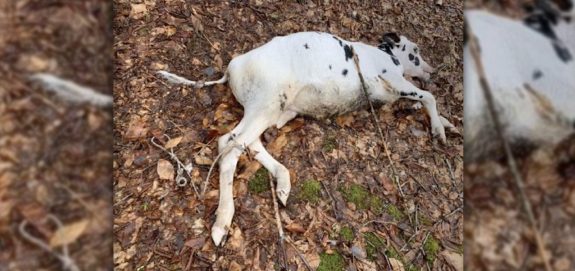Animal Justice is calling on the Canadian Food Inspection Agency (“CFIA”) and provincial authorities to investigate the suspicious deaths and disposal of two calves who were discovered by concerned citizens just a few steps off of a rural road in Black Rock, Nova Scotia in early May of 2021. A third calf was reportedly found dead in this same area under similar circumstances in 2020.
The calves were found partially bound by their legs and necks, and one of the calves had a hole in his ear where an ear tag had evidently been removed. Both calves were apparently male with black and white markings, strongly suggesting that they were byproducts of the dairy industry. Male calves born to female cows impregnated for their milk are useless to the dairy industry because they cannot produce milk. They are separated from their mothers shortly after birth, and typically slaughtered for veal.
Yet when concerned citizens called Nova Scotia Environment, which has authority to investigate cases of cruelty to farmed animals in the province, the agency refused to accept the complaint, and indicated it had no plans to investigate because the animals were already dead. This is unacceptable. If the deaths were due to abuse or mistreatment, the public has a right to know, and those responsible should be found and held accountable. In Nova Scotia, and across Canada, it is an offence to cause unnecessary suffering and unreasonable distress to animals, including animals used in farming. That’s why Animal Justice has written to the federal CFIA and provincial officials urging them to take action to enforce Nova Scotia’s Animal Protection Act and the federal Health of Animals Act.
This is not the first time that the disposal of animal carcasses has been an issue in Nova Scotia. In 2006, a pile of cow bones and decomposing body parts was discovered by hikers outside of Mavillette, in Digby County, Nova Scotia.
To protect farmed animals in Nova Scotia, Nova Scotia Environment should investigate animal cruelty complaints even when a farmed animal has already been killed. As with all Canadian provinces, Nova Scotia also needs stronger laws to protect farmed animals, including legally binding standards of care to protect their welfare coupled with regular, proactive inspections of farms housing animals. Transparency and oversight benefit farmed animals and the environment, and allow the public to know how animals are treated on farms.
Join the Animal Justice mailing list




